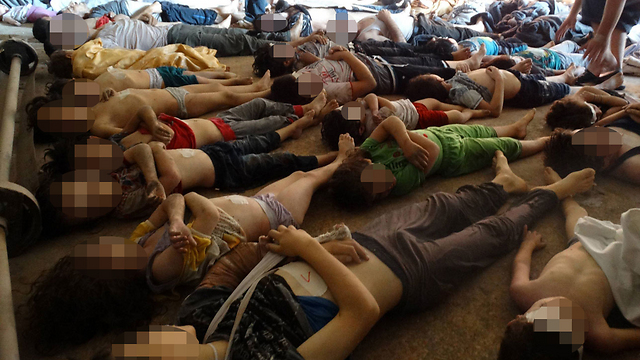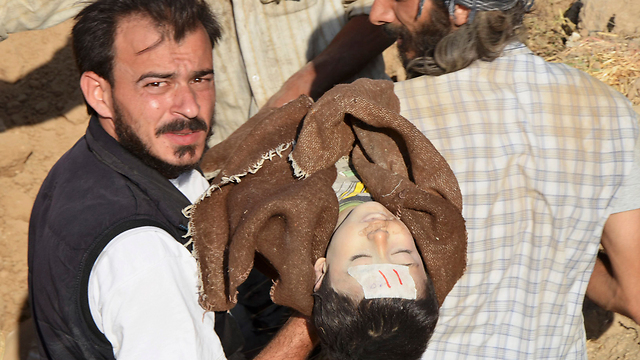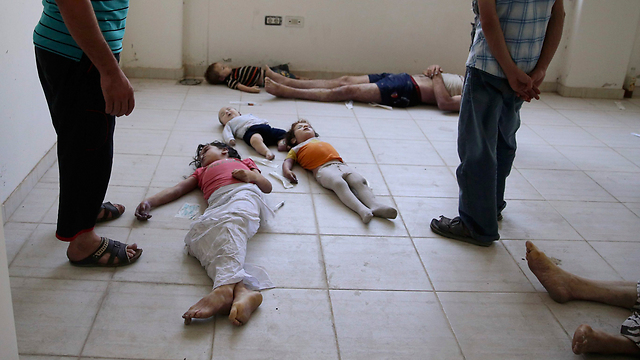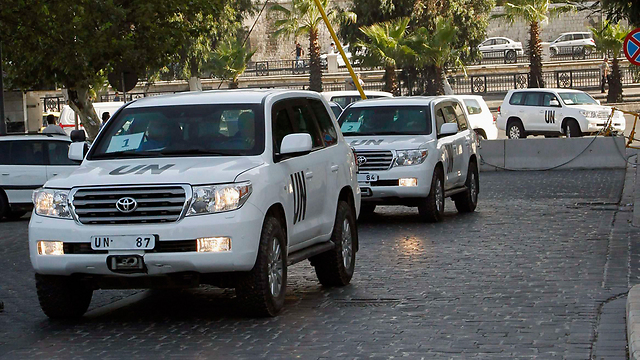US Secretary of State John Kerry on Monday, in a forceful statement, said all nations must stand up for accountability on the use of chemical weapons in Syria.
"What we saw in Syria last week should shock the conscience of the world. It defies any code of morality," Kerry said, adding that the information so far, including videos and accounts from the ground, indicate "that chemical weapons were used in Syria. Moreover, we know that the Syrian regime maintains custody of these chemical weapons."
Related stories:
- Assad: US assault on Syria bound to fail
- Syrian official: Israel 'will come under fire' if Syria attacked
- Skirting the ground: How the West will attack Syria
"The indiscriminate slaughter of civilians, the killing of women and children and innocent bystanders by chemical weapons is a moral obscenity," Kerry said. "By any standard, it is inexcusable. And despite the excuses and equivocations that some have manufactured, it is undeniable."
Kerry's statement
He said the US and its allies are collecting and examining further information on the attack, but clarified that all the evidence shows there was use of chemical weapons. He promised that the additional information in US hands will be released soon.
Kerry accused the Syrian regime of stymieing UN efforts to shed light on the events in Damascus, and said the regime's actions show it has "something to hide."
Kerry added: "President Obama believes there must be accountability for those who would use the world's most heinous weapons against the world's most vulnerable people."
Following Kerry, The White House spokesman Jay Carney said that it is undeniable that chemical weapons were used in Syria and that there is little doubt that the Syrian government used them.
President Barack Obama, Carney said, is evaluating the appropriate response to the use of chemical weapons but has made no decision on how to respond. Carney had no time frame for when Obama would decide.
"There is very little doubt in our mind that the Syrian regime is culpable," said Carney. He said it is undeniable that the weapons were used in what he called a violation of an international norm.
Gearing up
Meanwhile, the British Guardian newspaper reported that warplanes and military transporters have begun arriving at Britain's Akrotiri airbase on Cyprus, less than 100 miles from the Syrian coast, in a sign of increasing preparations for a military strike against the Assad regime in Syria.
Two commercial pilots who regularly fly from Larnaca on Monday told the Guardian that they had seen C-130 transport planes from their cockpit windows as well as small formations of fighter jets on their radar screens, which they believe had flown from Europe.
Residents near the British airfield, a sovereign base since 1960, also say activity there has been much higher than normal over the past 48 hours.
According to the Guardian, If an order to attack targets in Syria is given, Cyprus is likely to be a hub of the air campaign. The arrival of warplanes suggests that advanced readiness – at the very least – has been ordered by Whitehall as David Cameron, Barack Obama and European leaders step up their rhetoric against Bashar Assad, whose armed forces they accuse of carrying out the chemical weapons attack last Wednesday that killed many hundreds in eastern Damascus.
Ongoing investigation
US officials say the investigation into the chemical attack is largely meaningless because the Syrian government did not authorize it until evidence was likely destroyed by shelling late last week. Even without the investigation, officials say they have "very little doubt" that chemical weapons were used, based in part on the number of reported victims, the symptoms of those injured or killed and witness accounts.
Photos of the massacre (Photo: Reuters)
(Photo: Reuters)
(Photo: Reuters)
The alleged chemical weapons attack has moved the United States closer to military action against Syria than at any other point during the bloody civil war. But the Obama administration and international allies appear narrowly focused on a response that would punish Assad for deploying deadly gases, not sweeping actions aimed at ousting Assad or strengthening rebel forces.
The focus of the internal debate underscores the scant international appetite for a large-scale deployment of forces in Syria and the limited number of options beyond that which could significantly change the trajectory of the conflict.
More than 100,000 people have died in clashes between forces loyal to Assad and rebels trying to oust him from power over the past two and a half years. While President Barack Obama has repeatedly called for Assad to leave power, he has resisted calls for a robust US intervention, and has largely limited
American assistance to humanitarian aid. However, Obama said last year that chemical weapons use would cross a "red line" and would likely change his calculus in deciding on a US response.
UN inspectors returning to Damascus hotel (Photo: Reuters)
But last week's attack in the Damascus suburbs is a challenge to Obama's credibility. He took little action after Assad used chemical weapons on a small scale earlier this year and risks signaling to countries like Iran that his administration does not follow through on its warnings.
Syrian activists say the Aug. 21 attack killed hundreds; the group Doctors Without Borders put the death toll at 355 people. Assad has denied launching a chemical attack.
It's unlikely that the US would launch a strike against Syria while the United Nations team is still in the country. The administration may also try to time a strike around Obama's travel schedule, he's due to hold meetings in Sweden and Russia next week, in order to avoid having the commander in chief abroad when the US launches military action.
What remains unclear is whether the US will seek some sort of clearance from the UN before using force. While it's likely Russia and China would block the US at the UN Security Council, Obama last week spoke of the risks of proceeding without international backing.
"If the US goes in and attacks another country without a UN mandate and without clear evidence that can be presented, then there are questions in terms of whether international law supports it - do we have the coalition to make it work?" Obama said. "Those are considerations that we have to take into account."
The president pressed on Monday with several events unrelated to Syria, including a Medal of Honor ceremony for an Afghan war veteran and a meeting with faith leaders about this week's 50th anniversary of the March on Washington. But all around him, there were signs that Washington and the international community were ramping up for some type of response.
Kerry returned to Washington on Sunday night so he could attend Syria deliberations in person. The secretary, who spent the weekend making phone calls to various world leaders, had participated in Syria meetings at the White House last week by secure audio and video link. He had not been due to return to work until after Labor Day.
British Prime Minister David Cameron was also ending his vacation early to make calls to world leaders and chair a meeting Wednesday of his National Security Council to discuss potential responses to the deadly attack. The British government said it was also prepared to recall lawmakers to Parliament ahead of schedule so that they could debate any action over Syria, although it would "reserve the ability to take action very swiftly if needed." Parliament is due back in session on Monday.
Reuters, AP contributed to this report
- Receive Ynetnews updates
directly to your desktop



















